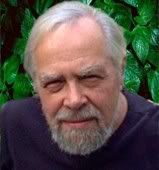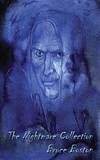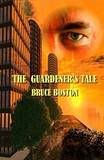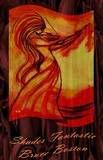Bruce Boston: Poetic Speculation
By, Rich Ristow
Bruce Boston’s The Nightmare Collection recently won the 2008 Bram Stoker Award for Superior Achievement in Poetry. For Boston, this recent accolade is part of a long resume within the realms of science fiction, fantasy and horror. Boston has won the Rhysling Award from the Science Fiction Poetry Association, where he was also accorded the title “Grand Master.” Boston’s acclaim has stretched beyond the genre world with a Pushcart Prize, and his other books of poetry include Sensuous Debris, Pitchblende, and Shades Fantastic. His fiction includes The Guardener's Tale, Stained Glass Rain, and the collection Masque of Dreams. Shortly before winning the Stoker, Dark Scribe Magazine sat down to talk to Boston about his poetry.
Dark Scribe Magazine: You are probably best known as a speculative poet. Some critics assert there's no such thing as "speculative poetry" — in that one would not find poetry genres mirroring romance or mystery fiction. How would you respond?
Bruce Boston: Although speculative fiction – in particular science fiction – is grouped as a genre with  mysteries and romance, it is significantly different. Mysteries and romance are written to be read mainly for entertainment; they generally have no substantive content. However, some science fiction and horror – as well as being entertaining – is more likely to deal with philosophical, social, and scientific ideas. Thus, poetry – akin to SF or horror in that it borrows from their tropes and images – is likely to do the same, in contrast to mainstream poetry, which more often deals with emotions and perceptions.
mysteries and romance, it is significantly different. Mysteries and romance are written to be read mainly for entertainment; they generally have no substantive content. However, some science fiction and horror – as well as being entertaining – is more likely to deal with philosophical, social, and scientific ideas. Thus, poetry – akin to SF or horror in that it borrows from their tropes and images – is likely to do the same, in contrast to mainstream poetry, which more often deals with emotions and perceptions.
I would think that the same critics who claim there is no such thing as speculative poetry, might also discount science fiction and horror as serious [forms of] literature. Anyone who has read widely in these genres knows this is not the case. In opposition to the contention that there is no such thing as speculative poetry, I’ve heard the claim that all poetry is speculative — it speculates on the nature of reality and the human condition.
Dark Scribe: How did you first start writing poetry?
Bruce Boston: I became familiar with poetry as a form early on because my mother read Robert Louis Stevenson's A Child’s Garden of Verses to me as bedtime stories. Once I learned to read, this same book was one of my first. I wrote poetry sporadically through grammar school, high school, and college, though by the time I was nine or ten, I was more interested in writing fiction. I did not begin writing poetry seriously until my mid-twenties, when I fell in with a group of writers in Berkeley who were mainly poets. I became the resident fiction writer of the group, editing fiction for several issues of their magazine, Berkeley Poets’ Cooperative, but I also attended their weekly workshops in poetry for nearly a decade. I heard lots of poetry read, discussed, and criticized, including my own, and in the process I honed my poetic skills.
Dark Scribe: Which poet do you admire most?
Bruce Boston: There is no single poet for me that stands head and shoulders above others. The ones I do like, I admire for different reasons. I admire Ezra Pound for his language and the range of his knowledge, Dylan Thomas for his passion and lyricism, Allen Ginsberg for his spiritual-emotional intensity and social awareness, Billy Collins because of his clever imagination and his ability to convey a great deal in very few words. Just as there are all kinds of ways to write poetry, there are all kinds of ways to appreciate it.
If you are after what poets have influenced me most, I'd say certain fiction writers – Robert E. Howard, Vladimir Nabokov, Henry Miller, Lawrence Durrell, to name a few – and the painter Salvador Dali – have influenced my writer’s voice, and thus my poetic voice, as much as poets have. I’ve always read eclectically, and I write eclectically, exploring many different forms and voices.
 Dark Scribe: How do you approach issues of form? In The Nightmare Collection you have prose pieces, free verse, and work that rhymes. How does your working with form help shape the content of your poems?
Dark Scribe: How do you approach issues of form? In The Nightmare Collection you have prose pieces, free verse, and work that rhymes. How does your working with form help shape the content of your poems?
Bruce Boston: I once had a discussion with a fellow poet about this. Borrowing a quote from renowned architect Louis Sullivan – “Form follows function.” – he argued that the same applies to writing poetry. It certainly is true of architecture. If you are commissioned to build a sports arena, you can't design its form as if it were a hospital or office building. Yet in the arena of poetry, function is more subjective and never quite so specifically defined. When I begin a poem, I don’t think in terms of what this poem should accomplish, its function. Seldom do I have a clear idea of its form. The process is more organic. A poem can begin anywhere: an image, a scrap of conversation, a news article, another poem or work of art. For me, it usually begins with a few lines and grows from there, with form and function interacting in the process. I often discover the function in the process of writing the poem. I’ve had poems that I later adapted as prose poems or flash fictions. The different form, the transition to prose, sometimes changed the thematic content of the piece. In those cases, function followed form.
Dark Scribe: In writing speculative poetry, you engage a fair amount in established myth and legend. How do you engage established myth versus creating your own?
Bruce Boston: In my poem “Curse of the Siren’s Suitors” I chose to write a short poem that was a simple retelling of a classic myth. However, with my poetry in general, this is the exception rather than the rule. Rarely do I set out to write anything based on specific myth or legend. The mythic association, when there is one, comes later. My poem “Curse of Medusa’s Husband” was adapted from a prose poem about a bedroom lined with mirrors that made no mention of Medusa.
Two collaborative poems that Marge Simon and I wrote – “Ajax Redux” and “Lilith Revisited” – existed as poetic narratives before the mythic figures were introduced. It became clear that the narratives of these poems resonated in some ways with stories that had been told before. By introducing mythic figures that readers may identify, a poem can work more effectively because it is grounded in our cultural heritage. Rather than merely reflecting myth, these two poems – as their titles imply – extend the tales and give them a different twist.
Dark Scribe: How does the writing process differ when considering long poems? Do you find that long poems need to be more narrative than lyrical?
Bruce Boston: Long poems are often more narrative as a way of holding the reader’s interest, but by no  means do they need to be less lyrical. Coleridge’s “Rhyme of the Ancient Mariner.” Poe’s “The Raven.” Or think of such homey classics as “Casey at the Bat” or “The Ballad of Sam McGee.” All of these poems are long, narrative, and lyrical. Although it does not contain traditional rhyme and meter, I think the same could be said of my long poem “Pavane for a Cyber-Princess,” which can be found in my collection Pitchblende (Dark Regions, 2003).
means do they need to be less lyrical. Coleridge’s “Rhyme of the Ancient Mariner.” Poe’s “The Raven.” Or think of such homey classics as “Casey at the Bat” or “The Ballad of Sam McGee.” All of these poems are long, narrative, and lyrical. Although it does not contain traditional rhyme and meter, I think the same could be said of my long poem “Pavane for a Cyber-Princess,” which can be found in my collection Pitchblende (Dark Regions, 2003).
Also, there are other ways besides narrative of holding the reader’s interest in long poems. Take a look at Allen Ginsberg’s “Howl”. At around 500 lines, this poem is long and lyrical, but not a narrative in the normal sense of the word. Rather, it begins with a passionate diatribe that moves from description to accusation, and ends as a kind of love poem. It attempts to hold the reader by the intensity of its visionary language and the scenes it is portraying. Likewise with my long poem “She Was There for Him the Last Time,” also in Pitchblende. A narrative exists here, but it is so intentionally jumbled in terms of chronology that it becomes secondary to the lyrical language and the visionary scenes being portrayed.
Dark Scribe: You also write fiction. How does the process of writing poetry inform your prose writing?
Bruce Boston: Writing fiction – unless it is flash fiction – is a very different process from writing poetry. The language still needs to flow smoothly, but you also have to include ordinary sentences such as: “He opened the refrigerator door.” or “She sat down and leaned back.” Yet you are still working with language, and there’s plenty of room in descriptive and narrative passages where poetic language can shine and enhance the text. Steve Erickson’s novels (Days between Stations, Rubicon Beach, etc.) are composed largely of narrative, containing many passages which could stand alone as poems. With regard to current horror fiction, you’ll find excellent dark poetry – not only in descriptive and narrative passages but in richly portrayed action scenes – in Michael McBride’s God’s End Trilogy, novels which should have received far more Bram Stoker Award consideration than they have.
 Also, in a broader sense, stories and novels can employ metaphor and symbol in the same way that poetry does. The dystopian society that controls the world in my novel The Guardener’s Tale scans its citizens to produce a holographic image of their lives in order to predict anti-social behavior. This image emerges as a configuration shaped like a flower. Images of flowers, plants, and organic growth are pervasive throughout the book, figuring in both negative and positive contexts, reflecting and embodying the themes of the novel, functioning the same way images often do in poetry.
Also, in a broader sense, stories and novels can employ metaphor and symbol in the same way that poetry does. The dystopian society that controls the world in my novel The Guardener’s Tale scans its citizens to produce a holographic image of their lives in order to predict anti-social behavior. This image emerges as a configuration shaped like a flower. Images of flowers, plants, and organic growth are pervasive throughout the book, figuring in both negative and positive contexts, reflecting and embodying the themes of the novel, functioning the same way images often do in poetry.
Dark Scribe: During the writing of The Guardener's Tale, how much of the political happenings of the real world around you at the time influenced your prose?
Bruce Boston: A line in a poem by Andrew Joron reads: “All futurity wears the head of an insect.”
I believe that what Joron was saying in a very compact way is that as societies become more modernized and technological, there is less room for individuality and more pressure to conform to established norms of behavior where one fulfills a function of the society rather than fulfilling one’s life as an individual. An extreme example of this can be found in the mechanized nightmare world of Fritz Lange’s Metropolis.
I’ve certainly seen this long-range trend in my lifetime, and that did have an influence on the general theme of The Guardener’s Tale. More recently, eight years of the George W. Bush administration seem to me to have been accompanied by an increasing abridgement of civil liberties and the invasion of individual privacy, while the United States continued to portray itself as a champion of freedom. The society in The Guardener’s Tale is much like this, defining positive and negative freedoms for its citizens, encouraging the former and prohibiting the latter, proclaiming itself as the freest society in human history. Though perhaps more than directly informing the content of the novel, the Bush years helped give me the emotional energy to finish the book, since I felt it had greater contemporary relevance than when I first conceived it.
Dark Scribe: Putting together and sequencing a collection of poems is hardly a random process. How do you balance humor in your work, in terms of using it occasionally while moving from the horrific and the speculative?
Bruce Boston: Assembling a book of poems in some ways resembles writing a story or novel because  the book is going to be more available to readers if it has a structure they can perceive. I write fantasy poems set in hypothetical pasts, poems in the contemporary world, and the science fiction poems set in hypothetical futures, so I’ve often employed a chronological approaching when putting a book of poems together: fantasy, contemporary, science fiction.
the book is going to be more available to readers if it has a structure they can perceive. I write fantasy poems set in hypothetical pasts, poems in the contemporary world, and the science fiction poems set in hypothetical futures, so I’ve often employed a chronological approaching when putting a book of poems together: fantasy, contemporary, science fiction.
On occasion I’ve used humorous poems as transitions between one section of a book and another, to break the mood that’s been created and begin in a new direction. Most of the humorous poems I write are dark humor, and some of my serious dark poems contain humorous or satiric touches. So more often I try to group those together. For example, in The Nightmare Collection, “It’s Not Easy Being Dead” is followed by “Monster Lover” and “Curse of the Giantess’ Husband,” all containing humor to varying degrees.
Putting together a book of poems is a balancing act in which you have to keep shifting poems around until you find the order you feel is most effective. To some extent this is a moot exercise since many readers will not read the poems in a collection in the order in which they appear.
Dark Scribe: What future publications do you have in the works?
Bruce Boston: The Spanish edition of The Guardener’s Tale should be out this month from La Factoria de Ideas. I have two books of poetry forthcoming later this year: a science fiction collection, North Left of Earth from Sam’s Dot Publishing, and a mostly dark collaborative collection – with nine other authors, including fellow SFPA Grandmaster Poet Robert Frazier – Double Visions from Dark Regions Press. Watch for more poems in Asimov’s SF and Strange Horizons, fiction in the Dark Wisdom Anthology, and also stories online as podcasts in Pseudopod and Escape Pod.
For more information about Bruce Boston, visit his official author website.




Reader Comments